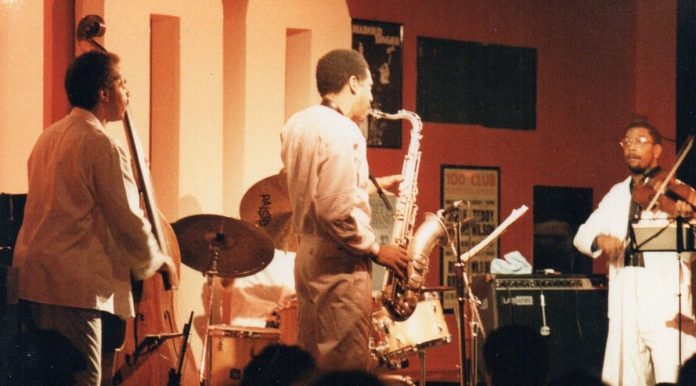
This film follows violinist Billy Bang as he returns to Vietnam in 2008, where he served as a young soldier 40 years earlier, and from which the experiences, including the harrowing role of a “tunnel rat”, would haunt him for the rest of his life. It follows Billy as he travels the country, from Ho Chi Minh City and the Mekong Delta through to the highlands and north across the 17th Parallel, meeting people, collaborating with local musicians and discovering the culture he never knew when first there.
Like many returning from the conflict, he lost his way, but in his case, fortunately found direction and purpose through music. He subsequently spoke about this experience, and addressed it through his albums Vietnam, The Aftermath (2001) and Vietnam: Reflections (2005).
The film doesn’t hold back, revealing intimate moments – the close-up of Billy’s eyes reflecting the inner turmoil and torment. Emotional and exhausted, he struggles to continue at times. A poignant episode is when the translator, Quynh Anh Pham, opens up about her own past, her violent and troubled father, and the way in which making the film with Billy has helped her confront her own demons.
The music on the film is wonderful – Billy relating to and recognising the link between the Vietnamese style of playing and sound and his own. The soundtrack is available on an accompanying album, Lucky Man (to be reviewed separately, but discography is below). The album is composed of recordings from the film, musical and oral, and includes Billy playing with saxophonist and Saigon club owner Trần Mạnh Tuấn, the Banhar Gong Group of Kuntum, the Phu Dong Family Band and even a session with the Hanoi Symphony Orchestra to produce a piece, Mystery Of The Mekong, which has his violin soaring above a rich aggregation of strings, resonant cellos and almost rhapsodic support from the piano. The film ends with a marvellous duet between Billy and Duc Dau, who plays a Dan Da, a stone xylophone, their interaction vibrant and uplifting.
This is a courageous venture to come to terms with the trauma of the past by the violinist, who was sadly to die in 2011; a moving film, interesting and thought provoking. It’s highly recommended, and a reminder of a talented, likeable musician.
Billy Bang: Lucky Man, a film by Jean-Marie Boulet & Markus Hansen. 80 mins, available through vimeo.com.
Lucky Man Soundtrack album:
Lucky Man: Introduction; Billy Playing With The Banhar Gong Group Of Kuntum (Traditional And Improvised); Flashback Tunnel Reflections; Mystery Of The Mekong; The Sun Rising – Introduction To Song For Don Cherry; Song For Don Cherry; Flashback Memories; New Saigon Phunk; Traditional Vietnamese Catru Music; Billy Reflecting On Memories And Feelings; Jungle Lullaby; Quynh Anh Pham’s Memories About Her Father; Dan Da; Billy Speaking About Music And Art; Flashlight And A 45 Tunnel Memories; Lucky Man Title Music: Vietnam 1967; Battle Composition; Teach Me Banhar; Traditional Quan Ho; Billy Reflecting On America, Music And Being Left Alone; Moments For The KIAMIA, Solo In A Hotel Interior Courtyard; Quynh Anh Pham Lullaby; New Saigon Phunk (triple album)
Bang (v) with various Vietnam musicians and groups.
BBE Music BBELP650, CD or vinyl through Bandcamp















